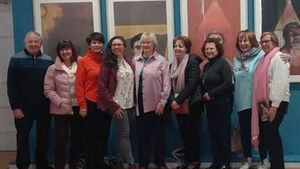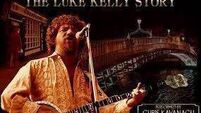View from the Green Room: Tramore quills sharpened

Tramore Writers Group.
I love the idea of a writing group. Some people think that writing is a hobby and best performed with a sharpened quill in the attic where no one knows it’s going on. Like an underground movement that’s steeped in mystery and magic.
The Romantics had a notion that you could only write when your muse was on your shoulder and when inspiration landed like a falling star.
Writing is not like that. It’s tough and soul-searching and frightening because your inner thoughts land up on someone’s in tray who might dismiss it as waffle…or lacking substance…or originality…or…and a dozen other dismissals that I could list.
Writing poetry is worse. Condensing thought and feeling and connection and insight into tightly-woven epigrams that work takes time and soul-searching and leaves a poet drained. Seán O Riordáin, the most famous poet in the Irish language, often wondered aloud if what he wrote was poetry at all?
That’s why writing groups are important. They give validation, encouragement and constructive criticism that works rather than wounds.
It’s Culture Night and the Tramore Writers Group gather in the Tramore Library for readings of their work. They’re a motley group of civil servants, librarians, teachers, fishermen, daughters and grandsons who’ve all got something to say that needs to be heard.
Eamon Duffin recalls the art of making a fisherman’s net that was passed down to him from his grandfather when family bonds were "side by side, building up a rhythm, swaying in unison".
Mary Howlett’s ‘Last Days of June’ as she said her goodbyes to her mother with a whispered "I love you mam" in a time when emotions shared were as rare as a hundred-pound note.
Brazilian Julia Menezes shares the conflicting emotions of the emigrant’s before-and-after paradoxes that never leave.
Maura O’Sullivan remembers, as only a daughter can, every detail of ‘My father’s Hat’ – an article of clothing that defined him. His meticulous fashion statement of an era when flat caps were the only hats men could afford had many statements. A tap to greet a lady, placed over heart on news ‘of a recent death’ and ‘removed with dignity at church door’.
Mary McKenna captures the sense of dislocation that a new family living in ‘My Father’s House’ brings with ‘not my home anymore, family have passed on’ as she moves on to stand before her own house ‘home at last’.
Deirdre Ó Maidín has a funny ‘Ode to the Humble Potato’ that is "queen of every family and can wear a hundred jackets".
Ann Dowling describes summer life on ‘The Ladies Slip’ as the tide ebbs and flows and casts a thousand patterns. Most of all, Ann remembers the ghosts of times past when she "marched her young children down to the strand…for their morning’s freedom and mine".
Geoffrey Lomax’s experience of grief finds succour among the bluebells and soothing sounds of Newtown Woods in his sensitive lyric in ‘Nature’s Haven’ just as Marie Butler does in ‘Stilled’ when "soft lilac blooms wave for attention…and …nothing else matters".
Liz Walsh feels the years passing by all too quickly in ‘Antiquating’ as the reality of aging strikes home …"plump…memory…flat feet…sagging bum…" This poet reminds us that we can all still dream of "a Lamborghini and a pink silk scarf…and a dark brown-eyed lover serenading me".
Maeve Delahunty tells a tale of simple courage when a young baby bird takes its first baby step into the complete unknown, that is a joyous celebration of young life.
The Tramore Writers’ Group meet every fortnight at Tramore Library. Tonight’s poetry session is dedicated to fellow-writer Veronica Mackessy who sadly passed away earlier this year.






